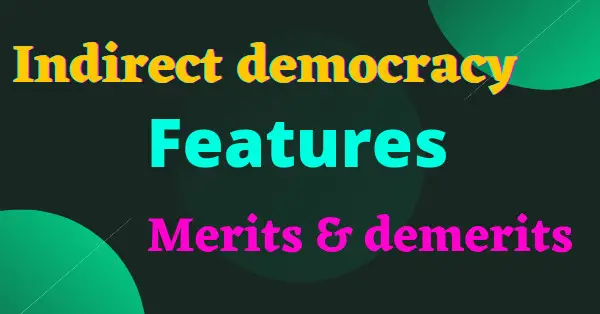Indirect democracy is prevalent in most countries. In this democratic system, elected candidates are in charge of governance. In general, the rule in which the legally sovereign public arranges to rule on their behalf in the hands of their representatives without directly participating in government water is called indirect or representative democracy.
What is Indirect democracy ?
Indirect democracy is a system of governance,where people directly does not participate in the law making process but they elect their representative to make law for them.
Indirect democracy example:-
There are some countries,which are following indirect democracy. Among them, India is one. Others countries are united state of America, UK and Canada .
Characteristics of Indirect democracy:-
1. Representative Administration: In this system of governance, citizens elect their representatives through elections. The government is run by the representatives with the support of the people. The elected representatives are the real government officials.
2. People’s entrusted with Sovereignty: In an indirect democracy, people have sovereignty. Here, opinion of people is same as the opinion of God. Government changes in majority. Public opinion is not ignored by the government. The government does its work for the public.
3. Elected representatives prepare laws: Elected representatives make laws on behalf of the public. In their majority opinion, the law is enacted. People’s opinions are not given much importance for this. The general public does not have much opportunity to interfere in governance.
4. Importance of Legislature: The importance of the Legislature is very important in an indirect democracy. Elected representatives make decisions in the legislature and in the majority opinion for the benefit of the public. The legislature is the most powerful and best institution and the legislature is the best for the protection of the public interest. Ignoring the legislature makes the progress of indirect democracy impossible.
5. Impartiality of the Judiciary: The judiciary is like the safety net of democracy. It seeks the truth and builds a progressive society by trying to maintain equality, freedom and impartiality. It plays an important role in promoting peace and friendship among the people. The judiciary is most important for democracy, as it helps in the spread of democracy.
Merits of indirect democracy
1. Suitable for big states: Indirect democracy is Big Useful to the nation. Elected representatives take on behalf of the people as a rule. There are many benefits to making it. As a result, the individual’s talent blossoms.
2. Representatives tenure is limited:
The term of office of elected representatives of democracy is limited. They face re-election after their limited time. As a result, no one has the opportunity to become a volunteer.
3. Establishment of welfare administration; In this system of governance, government officials are always on the lookout for public good. The delegates can not be ignored because they are one of the members of the public. Public interest is their sole responsibility.
4. Personality development of individuals: In indirect democracy, the hidden talents of the individual have the opportunity to be easily exposed. Political talent develops through elections. The realm of governance easily makes everyone aware of your own training citizens.
5. Election system: The electoral system is very useful for making indirect democracy more lasting and more popular. This arrangement allows one of the many to be elected as a representative and the opportunity to work on behalf of many. As a result, many problems are easily solved among the elite. This system is important for independent opinion, and majority opinion is always accepted.
Demerits of indirect democracy
1. Representatives are self-centred: Representatives who take direct responsibility as stakeholders in governance place more importance on their own interests than on the public interest. He does all the work by disobeying the law for the sake of his own interests. Once elected representatives, there is no problem in illegal money laundering for the next five generations.
2. Public are neglected: The way in which representatives interact with the public before an election does not remain the same after the election. The meeting of the public representatives was not held in a timely manner, so that the service attitude of the delegates was not reflected as a servant, but was influenced by the master’s oppressive thoughts. In this system, once elected members are elected, delegates are given unlimited power for almost five years. People can’t withdraw them. So some of them are arbitrary.
3. Corrupted system: Corruption in an indirect democracy continues to increase its scope. In the fight for power, there are a number of anti-corruption measures aimed at proving equality and the rule of law. Corruption, lies, oppression, the influence of bureaucrats in the regime, and the Nalifa system dominate this system of governance.
4.Party spirit:- The rulers do what is necessary to strengthen the party’s position by distorting the basis of national governance. Because party affiliation helps him get to power.
5. Corruption in elections: In an indirect democratic system, money, bribery, and misconduct have already polluted elections. As a result, eligible people are losing the election, while criminals are winning the election. “It simply came to our notice then.

